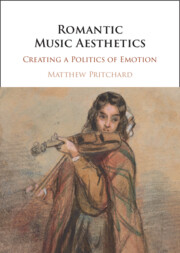Book contents
- Romantic Music Aesthetics
- Romantic Music Aesthetics
- Copyright page
- Contents
- Figures
- Music Examples
- Acknowledgements
- Note on Translation
- Introduction
- 1 Staging Sentimentality
- 2 The Legacy of Rousseau
- 3 The Composer as Genius
- 4 Idealist Aesthetics and the Music Critic
- 5 Picturing the Musical Absolute
- 6 Between Idealism and Realism I: The French Socialists
- 7 Between Idealism and Realism II: After Hegel
- 8 From Hanslick to the Twentieth Century
- Conclusion: The Fate of Feeling
- Bibliography
- Index
2 - The Legacy of Rousseau
Published online by Cambridge University Press: 22 November 2024
- Romantic Music Aesthetics
- Romantic Music Aesthetics
- Copyright page
- Contents
- Figures
- Music Examples
- Acknowledgements
- Note on Translation
- Introduction
- 1 Staging Sentimentality
- 2 The Legacy of Rousseau
- 3 The Composer as Genius
- 4 Idealist Aesthetics and the Music Critic
- 5 Picturing the Musical Absolute
- 6 Between Idealism and Realism I: The French Socialists
- 7 Between Idealism and Realism II: After Hegel
- 8 From Hanslick to the Twentieth Century
- Conclusion: The Fate of Feeling
- Bibliography
- Index
Summary
During the 1750s and 60s, Rousseau formulated perhaps the most influential philosophical and political arguments for sentimentality and the tableau. Against the claim of early capitalist ideologues that society was no more than a rational balance of individuals’ material ‘interests’, Rousseau imagined the mythical origin of society as a theatrical scene or musical performance, in which self-regard or vanity (amour-propre) competed with sympathy and tenderness towards others. The balance between these could be tipped away from individualism through the persuasive power of sentimental music and drama, shaping public opinion by absorbing audiences in its affecting tableaux. This vision proved its political effectiveness in eighteenth-century opéra comique and nineteenth-century Romantic melodrama. On the other hand, Rousseau’s denial of rights over public sentimental feeling to women, though contested, in the long run weakened sentimentality by making it into a private, domestic commodity – as shown by the history of another genre Rousseau inaugurated, the romance.
- Type
- Chapter
- Information
- Romantic Music AestheticsCreating a Politics of Emotion, pp. 50 - 74Publisher: Cambridge University PressPrint publication year: 2024

